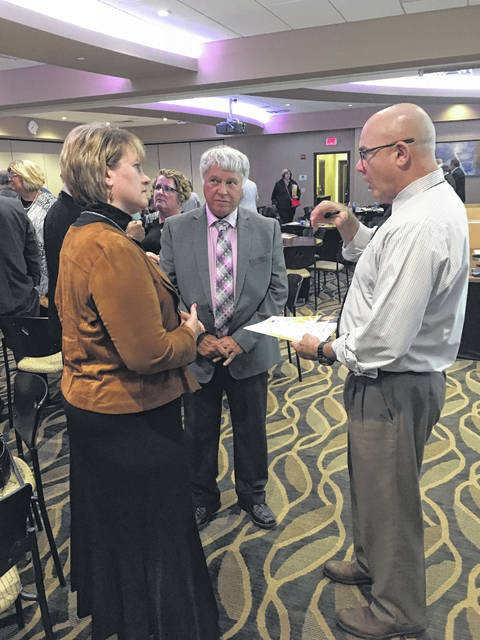
BEAVERCREEK — Sidney Mayor Mike Barhorst and Councilmembers Ed Hamaker and Joseph Ratermann attended an Elected Officials Opioid Symposium Friday evening. The Bringing Humanity and Data to the Opiate Epidemic Symposium, hosted by Fairborn Mayor Dan Kirkpatrick, was held at the Soin Medical Center in Beavercreek.
Coming just one day after President Donald Trump declared opioid abuse a national public health emergency, the symposium had been planned for more than two months. The event included a panel discussion, presentations from Greene County Coroner Dr. Kevin Sharrett, TCN Behavioral Health Psychiatrist Dr. Brian Merrill, and the personal stories of a number of recovering addicts.
Merrill detailed the use of opiates throughout history, tracing usage back to Mesopotamia in 3400 BC. He also defined opiates and spent some time discussing why they are so addictive.
Merrill provided scientific evidence that addiction is a brain disease, and spoke about the complex nature of the brain, comparing it to other less complicated organs.
“There is so much we don’t understand about the brain,” he said.
Merrill discussed programs that work.
“There are longitudinal studies conducted by the Mayo Clinic that show that prevention programs offered to student as young as first grade work,” Merrill told the elected officials from across the Miami Valley. The group of elected officials included members of the General Assembly.
Merrill also lauded the research based training offered by the Child Care Training Center for foster care parents. “The research based training provides helpful strategies for parents who are rearing foster children,” he said.
Merrill also stated his views concerning marijuana. “It is clear to me that the early use of marijuana leads kids to using harder drugs.” The sentiment was echoed by every recovering addict when they spoke.
Panelists included Fairborn Municipal Drug Court Judge Beth Cappelli, Women’s Recovery Center Executive Director Michele Cox, Christopher House Manager Nate Crago, The Hope Spot Executive Director Amy Pulver and TCN Behavioral Health SUD Division Manager Lynn Oliver. Panelists discussed treatment, recovery and intervention strategies. Emphases was placed on the importance of 12-Step programs.
Pulver spoke about her husband, who overdosed several times before dying. “Greene County did not fail my husband,” she said. “He didn’t do what he needed to do to stay clean.”
A number of recovering addicts told their very personal stories of addiction and eventual recovery. Following the program, Hamaker remarked about the broad cross section of the community the speakers represented.
“The speakers included representatives from virtually every socio-economic group – people with college degrees to those who didn’t finish school – kids who grew up abused to those who grew up in upper income homes – that surprised me,” Hamaker stated. Hamaker represents Sidney’s Third Ward.
Sharrett spoke about the devastating impact on communities and the financial drain on local government. “Across the United States, there are about 175 deaths each day attributed to drug overdoses,” Sharrett said. “That’s seven each and every hour.”
Sharrett explained Montgomery County has more overdose deaths than any other county in Ohio, and that Greene County is now ranked ninth. “We’ve broken into the top 10,” he stated. “That’s not some place we want to be.”
Sharrett described the impact that fentanyl has had on his office. “Our deaths from fentanyl have gone from 15 in 2014 to 45 for the first three quarters of 2017 – and we still have a quarter to go. One gram of carfentanyl can kill 5,000 people. It’s inexpensive to manufacture, and a whole lot easier to hide that a kilo of heroin.”
Kirkpatrick wrapped up the evening with the admonition that elected officials should remember three things.
“You need to move beyond thinking that addiction is a disease of moral character and to understand that it is a brain disease; you need to learn about local resources available in your community, and you need to remember that the opiate crisis has a human face,” he said. “Realize the role you can play and remember that funding is an important part of this.”
“Despite the weather and the fact that this symposium was held on a Friday night, it was the most educational event I have attended about the opioid crisis,” Barhorst said. “Each of the speakers was outstanding, and each offered a glimpse into the struggles they face every day – from the addicts struggling with their addiction, the coroner struggling to find the funds to conduct twice as many autopsies as he conducted last year, the judge struggling to find legal solutions that work and the many social service agencies struggling to find enough money to do the work that so desperately needs to be done – it was well worth attending.”


